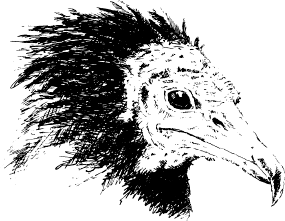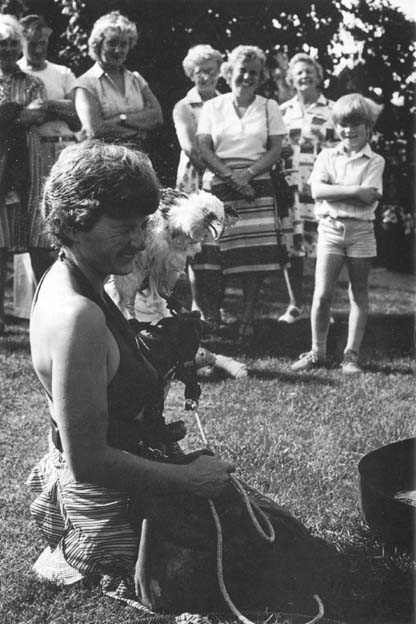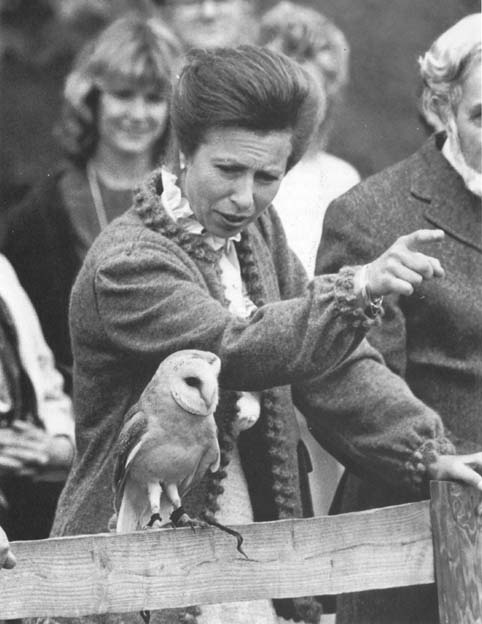

Egyptian Vulture
While I was thinking about this chapter, I was going through all the ways I could defend falconry and put it in a fairer light than it has had recently. But I actually believe there is nothing to defend. It is, in Britain, a perfectly legal sport and most of us are doing it perfectly legally. The same can be said of the United States and most other countries where falconry is legal. So, to all those people who try to force falconry into a defensive position, I rather feel like saying balls to the lot of them, but I suppose I had better not. Falconry has had the most enormous amount of bad publicity and so, given the chance to get something in print, I should not lose the opportunity to put the record a little straighter.
There is no species of raptor in the world that has been, or is, to date, being threatened by falconry. If we look back into history, we find that many more birds were taken from the wild in this country for falconry during the Middle Ages than have ever been taken this century, yet no species suffered a decline. Indeed, far more destructive things have happened to birds of prey over the centuries in terms of persecution and it would be fair to say that breeding populations were not affected until after World War II, when the arrival of synthetic chemical pesticides and the start of wholesale destruction of tropical forests and other natural habitats, began to cause serious environmental problems. Yet when I ask visitors to The NBoP Centre if they know why the Peregrine, for example, became rare in Britain, almost all of them blame falconers or egg collectors. This is mainly because of the massive and inaccurate propaganda put out by the press and bird societies. In truth, the Peregrine was brought to a low ebb by the pesticide DDT. It is not only no longer rare in Britain but has, since the voluntary ceasing of the use of DDT in this country, made one of the most successful recoveries of any animal put in peril.
There has always been the most amazing rubbish spoken about the Peregrine, particularly in the press. I have suffered myself, from lack of research for the truth, in a Sunday Times article. It seems that newspapers like to find a story that lends itself to drama and use it regardless of the effect. I suppose the thing that upsets me the most is the fact that I can see no good as regards the conserving of Peregrines, or any other bird of prey, coming out of this sort of journalism. It does nothing for conservation.
Birds of prey are not exactly cheap, but they have never fetched the sort of monies that have been suggested by the spate of publicity world-wide. Nor, when you add up the total costs of captive breeding are birds so overpriced in real terms.
Occasionally a Saker will fetch a lot of money from an Arab buyer in the Pakistan markets, when it is a large, particularly beautiful passage bird of very pale colour, and even more so if more than one person wants the bird. Then it becomes a matter of prestige to be its owner. But the prices quoted by bird societies and newspapers are mostly founded on excellent imaginations and little else.
It is interesting to note that over 90 per cent of the world’s breeding schemes for birds of prey have been started by people with an interest in falconry. These are often run by falconers. The offspring from many of these breeding projects are willingly and lovingly released, and it gives many falconers great joy to see such success, contrary to those people who are convinced that falconers are only interested in seeing birds in captivity.
Being open to the public, one has a much greater chance to see how the public react to falconry and the keeping of birds generally. There can be no doubt that the general public are much more aware about wildlife now than previously. Anyone keeping wildlife in captivity has to be very careful to do so well, and with just reason.
We fall between two stools here because basically we are a specialist zoo, containing nothing but birds of prey, but we also are falconers ourselves and employ falconry methods to train our birds and fly them during demonstrations for the visitors. I think sometimes the visitors get confused, and many say how they don’t like zoos but enjoy coming to visit us here. Yet, we are a zoo. Not all our birds are flown by any means. The majority of them are in pens for breeding, albeit in pens that are improving all the time, and our success rate is high. People love to see the birds fly, but are worried about seeing them tethered. On the other hand, the tethered birds are sometimes very close to the public with no wire between them and the watching visitor which is wonderful for photography, and the visitors love being able to see them at such close quarters.
By being open to the public we share our collection with them and because we are always available to talk to the visitors particularly during and after flying demonstrations, we have a wonderful opportunity to put over what we feel about conservation. We get very good feedback about how people feel concerning the job we are trying to do. This tends to keep one on one’s toes, which is excellent for anyone working in the conservation field. It is important to have to explain what you are trying to do because it not only gets the message across, but makes you think about the pros and cons of what you are doing, and if you are doing it right, on a very regular basis.

Heidi and I having a bath!
It is the responsibility of all falconers to understand the need to explain to interested bystanders what is being done and why. Not to justify, nor to tell how, merely to explain. Some falconers think, mistakenly, that it is better to make falconry appear very difficult and perhaps mystical, thinking this will put off people who might be interested in taking up the sport. In fact, very often this has the reverse effect. We found the best way to put people off starting was to teach them how to do it—show them all that is entailed, preferably in the winter when it is cold and miserable and the bird still has to be flown and cared for, even when one’s hand is almost frozen in the glove and a bird landing hard is positively painful. Then only those who are genuinely interested will continue and those who thought they might like to start, have learnt a great deal, hopefully had an enjoyable time and decided against starting. I always take my hat off to these people who have obviously learnt the real message on a falconry course, which is only take it up if you are in a position to do so properly.
As said before, falconry has not and is unlikely ever to have any detrimental effect on wild species of raptor, but it has had many beneficial side effects. As well as the enormous advances in the knowledge of raptor diseases, there are now many more vets interested in birds of prey. Both these facts are, in great part, due to the numbers of captive and injured wild birds brought to them by falconers. A very high percentage of those people who take in, treat and care for injured wild birds from the public are falconers. Insight into the behaviour and habits of birds of prey has come from falconers, who have the chance to get to know a potentially wild bird in a way that no scientist can.
Falconry gives a great deal of pleasure to an increasing number of people, and at a point in our history when mankind is going through some pretty uneasy and worrying times. Unemployment, poor education and often lack of ambition means that many people go through life with little to interest them, becoming television addicts at best, and gaining addiction to much more dangerous products at worst. I believe that if wild populations are unaffected and captive populations are happy, flown and well cared for, falconry is a good thing if controlled. Those who would like to see it banned usually have little experience or understanding of the relationships that can be formed between man and animals. In fact it always seems a shame to me that the various anti brigades could not put their undeniable energy into realistic conservation projects and efforts, rather than trying to stop something that has been a part of mankind for centuries—involvement with wildlife.

Help with conservation is needed from everyone. The Princess Royal opened our Eagle Barn in June, 1987. Now foster parent to two pairs of Barn Owls, she is seen here explaining the complexities of audio-directional technology—’It’s over there!’
To be a conservationist in the sense that I hope I try to be means that one must be an optimist. When looking at the countless problems that affect the conserving of our world as it is today, it would be very easy to give up, to say that what ‘I’ do is of such insignificance that it cannot possibly have any long-term effect or results would probably be very close to the truth. But it is not the attitude any of us can afford to have. The more of us there are who try and do a little bit, however small and however insignificant, the more it adds up.
I wish there wasn’t a division between those who call themselves falconers and those who call themselves conservationists. However, it is there at the moment and although it upsets me, I will have to talk in terms of this division as I can find no other words that I can use. I would term myself as being both, a falconer and a conservationist, flying birds for hunting (although not often right now I will admit), and running a Centre that is open to the public, endeavouring to manage captive breeding, release and educational schemes. There are many conservationists who would disagree with me. They would say that falconers put pressure on wild populations of birds of prey, and are generally anti-conservation, only wanting birds of prey in captivity.
Very often falconers are their own worst enemies, not always having the political awareness to cope in the right way at the right time with some of the accusations thrown at them. There are among falconers a group which flout the law, and take birds and eggs illegally regardless of the long-term damage done to the reputation of other more genuine falconers and the sport itself. These people very obviously don’t have either their fellow falconers’ or the sport’s welfare at heart. Conservationists love this unpleasant faction in falconry as it hands them ammunition on a plate. There are, and always will be, conservationists who would like to see the sport of falconry banned and the keeping of birds of prey made illegal. They grab at bad publicity on falconers or the sport and use it for all they are worth.
Some falconers deny that the bad element are actually true falconers, but this is a poor argument and in many cases not true. To wash one’s hands of the less desirable in one’s own field of work, interests or hobbies is the escapist’s way out and no argument in defence of that sport or hobby. In every facet of life there are good and bad elements. There are bad policemen, teachers, doctors, scientists, dentists, conservationists and so on. Falconers don’t believe that the poor among these groups are not real teachers, scientists etc; they fully realise that for every bad one there are probably hundreds of good ones. Perhaps those who constantly tar all falconers with the same brush should be more open-minded.
Because of my personal interest in conservation, I go to conferences on birds of prey all over the world. I was really excited when going to my first one, thinking of meeting all these people who were as interested in raptors as I and talking to them. But I was wrong. Many were not in the slightest bit interested in sharing information, particularly with someone from a non-scientific background who had no official letters after her name. How could anyone know anything at all about birds of prey if she did not have at least one scientific degree and preferably more?
I was, at the end of it, very disillusioned and upset. But I was glad in the long run that it happened. It took about six months before I had thought the whole thing through and got over it. But I learned a great deal. I learned that you have to be politically aware to work in the conservation field. That many scientists don’t particularly like to talk to non-scientists, but that they also have to work hard to get the funding they need to earn a living and carry out the research that interests them. And that some of them are wonderful people who have over the intervening years become my good friends.
But most important I learned that until falconers, scientists, bird societies and all others with an interest in birds of prey all over the world learn to agree to disagree over some points, all of them relatively unimportant, realise that the long-term aims of each group are roughly the same, and learn to work together, conservation will be very much the poorer. The real enemies of birds of prey are economics, politics and culture. All those aspects of the world need to be tackled with unity and the ‘in fighting’ among conservationists must stop before it is too late and we have nothing left to conserve.
Conservation should be part of everyone’s daily life, and starts in everyone’s home, although most people prefer to ignore that fact. We cannot even blame our poor record in conservation worldwide on ignorance, but on apathy. We in the First World can no longer say that we do not see the dangers in polluting the world, in denuding it of life-giving, oxygen-giving plants or destroying our very atmosphere with such mundane things as aerosol sprays. We have been told, the warnings are there, and yet we choose to ignore them. How many of us have given up using the dangerous aerosol sprays rather than use the good ones around the house, or refuse to use up the world’s hardwoods in our homes as front doors, windows, kitchen furniture—even throwing away old but perfectly serviceable furniture to do so. Do we look to see where our products come from so that, for example, we could put economic pressure on the Japanese to stop them fishing out all our oceans before it is too late? How many of us are looking into using lead-free petrol in our cars? The lists are endless and all relevant to most of us in our everyday lives. Perhaps you would prefer just to wait until all these things are either banned, or the natural products just run out. This is of course the easy way, the apathetic and, shamefully, the normal way.
If you say that you like birds of prey, for example, or want to be a falconer or a bird watcher or a conservationist, there are thousands of things that every such human in the world can do in small ways to help conserve not only birds of prey, but the whole ecosystem.
Without this delicate and beautiful ecosystem mankind will finally pass into the extinction he has so justly earned, sadly and unforgivably taking with him all other living things that did not earn and do not deserve that end.
